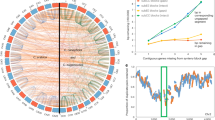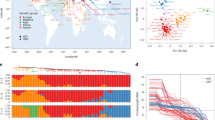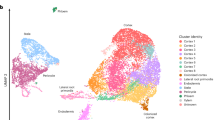Abstract
PLANTS of Dactylis, both diploid and tetraploid, from the Mediterranean region can be included on purely morphological grounds within the limits of Dactylis glomerata ssp. hispanica (Roth) Nym. There is only one constant feature of this taxon, described by Domin1 as follows: “the typical ssp. hispanica in one form or another has lemmas divided into two blunt lobes from the middle of which grows a very short awn, or a mere point, which sometimes does not even reach the size of an awn; sometimes the lobes are pointed”. Many Mediterranean populations of this broad type have now been studied at Aberystwyth, and among them a form of particular morphological interest has been found.
This is a preview of subscription content, access via your institution
Access options
Subscribe to this journal
Receive 51 print issues and online access
$199.00 per year
only $3.90 per issue
Buy this article
- Purchase on Springer Link
- Instant access to full article PDF
Prices may be subject to local taxes which are calculated during checkout
Similar content being viewed by others
References
Domin, K., Acta Bot. Bohem., 14, 131 (1942).
Rebischung, J., Ann. Amél. Pl., 3, 346 (1953).
Author information
Authors and Affiliations
Rights and permissions
About this article
Cite this article
BORRILL, M. A Morphologically Distinct Ecotype of Dactylis glomerata L.. Nature 179, 544–545 (1957). https://doi.org/10.1038/179544a0
Issue Date:
DOI: https://doi.org/10.1038/179544a0
Comments
By submitting a comment you agree to abide by our Terms and Community Guidelines. If you find something abusive or that does not comply with our terms or guidelines please flag it as inappropriate.



